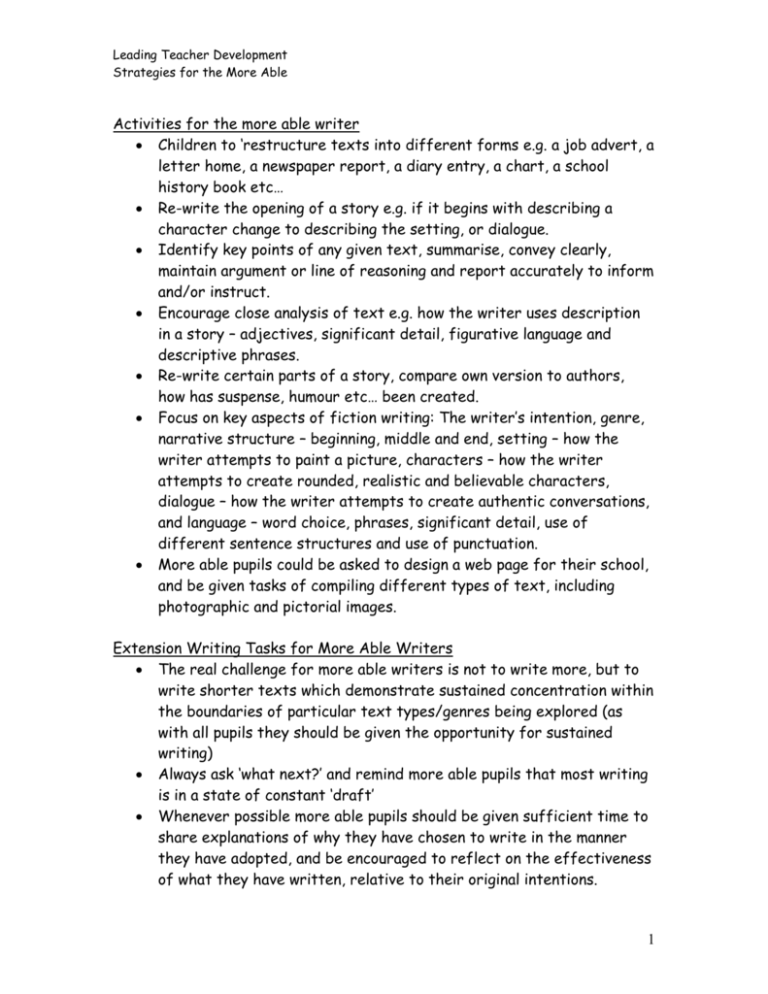Activities for the more able writer
advertisement

Leading Teacher Development Strategies for the More Able Activities for the more able writer Children to ‘restructure texts into different forms e.g. a job advert, a letter home, a newspaper report, a diary entry, a chart, a school history book etc… Re-write the opening of a story e.g. if it begins with describing a character change to describing the setting, or dialogue. Identify key points of any given text, summarise, convey clearly, maintain argument or line of reasoning and report accurately to inform and/or instruct. Encourage close analysis of text e.g. how the writer uses description in a story – adjectives, significant detail, figurative language and descriptive phrases. Re-write certain parts of a story, compare own version to authors, how has suspense, humour etc… been created. Focus on key aspects of fiction writing: The writer’s intention, genre, narrative structure – beginning, middle and end, setting – how the writer attempts to paint a picture, characters – how the writer attempts to create rounded, realistic and believable characters, dialogue – how the writer attempts to create authentic conversations, and language – word choice, phrases, significant detail, use of different sentence structures and use of punctuation. More able pupils could be asked to design a web page for their school, and be given tasks of compiling different types of text, including photographic and pictorial images. Extension Writing Tasks for More Able Writers The real challenge for more able writers is not to write more, but to write shorter texts which demonstrate sustained concentration within the boundaries of particular text types/genres being explored (as with all pupils they should be given the opportunity for sustained writing) Always ask ‘what next?’ and remind more able pupils that most writing is in a state of constant ‘draft’ Whenever possible more able pupils should be given sufficient time to share explanations of why they have chosen to write in the manner they have adopted, and be encouraged to reflect on the effectiveness of what they have written, relative to their original intentions. 1 Leading Teacher Development Strategies for the More Able More able pupils should be encouraged to use their writing portfolio to compare examples of their work in detail over a long period of time and comment upon the progress they have made. More able writers should regularly be challenged to justify and explain their writing choices, at the drafting stage, and refer back to the ‘models’ on which they should be more specifically basing their own text. More able pupils should be assisted in analysing and meeting the needs of their audience with greater precision. More able writers should be encouraged to enter writing competitions set up by different agencies, and encouraged to look through published entries of winners to discover new ideas and consider special features of those entries. Pupils should be assisted in making relationships with other writers across the country, through the internet. Pupils in different schools have exchanged narratives, begun narratives in one school which have been continued in others, and developed the drafts of other writers. More able pupils should be urged to rework written text in different contexts or genre. Bloom’s Taxonomy of Thinking Skills applied to English KS1 Examples Knowledge Comprehension Application Analysis Synthesis Read the big book and write down all the words which mean say or said Put the words in order of loudness Make a list of words which can be used to show someone speaking and use them in your own sentences Find some of these words in your friend’s storybook. See if you agree with the writer about his/her choice of word. Act out some sentences for the class/another group/each other and see whether they can guess the word used from the way you speak e.g. mumbled 2 Leading Teacher Development Strategies for the More Able Evaluation KS2 Examples Knowledge Comprehension Application Analysis Synthesis Evaluation Here are two short stories. They are the same but one has a variety of words for speaking. The other only uses said. Write about the difference between the stories. What’s the difference between a metaphor and a simile? Read this poem and underline the metaphors, explain the effect of each one. Make up metaphors to describe an animal of your own choice Read some more poems in an anthology. Find some more metaphors and explain why the poet used each one Write a definition of a metaphor. Try to write a short story using metaphors to replace every noun. In which ways are metaphors useful? List all the reasons why the world would be a poorer place without metaphors. 3



![afl_mat[1]](http://s2.studylib.net/store/data/005387843_1-8371eaaba182de7da429cb4369cd28fc-300x300.png)


